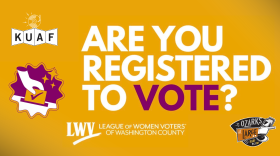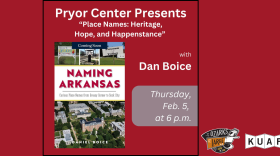The more-than-30-year-old nonprofit agency, the Northwest Arkansas Children’s Shelter, has welcomed more than 13,000 children since its establishment, with a mission to be a safe haven for children who have experienced trauma.
“And that is children from all over Arkansas. So if that's abuse, abandonment, neglect, child trafficking, this is a place that is a safe haven that children can go and receive everything they need to heal, then set them up for success on that next step of the journey.”
Rebecca Mitchell is the CEO of the Northwest Arkansas Children’s Shelter. For the past 15 years, the shelter has been on 80 acres in Vaughn. That’s a small community now on the very border of an ever expanding Bentonville. The shelter is staffed 24 hours a day, seven days a week, since children come into the staff’s care 24 hours a day, seven days a week.
More than 230 children were at the shelter for some time during the last fiscal year. About 50% of the children arrived from Benton and Washington counties, and about 50% arrived from the other 73 counties in Arkansas.
Mitchell says the mission for the shelter remains the same in 2025 as when it opened in 1993. But she says a changing world and a growing region can mean the needs of children can change.
“In many ways. In some ways, no, right? It’s one caring adult, and that’s really what every child needs. But when you look bigger picture at our community and the needs specific to our community, they’re constantly changing.”
To address those changes, the shelter’s leadership team recently conducted a strategic planning process. This summer, the shelter has launched work to support foster families.
The shelter’s director of foster care licensing, Brandy Shioyama, says the agency is working with a license granted by the state.
“Essentially, the state is contracting with our agency to license foster families. That looks like us going out in the community, recruiting families, educating families on the need. A lot of people don’t realize that there’s 400 children in foster care in our area because of how affluent we are. You know, we don’t see. We don’t see the need. We see the fancy buildings and cars and Teslas and things like that. And so it’s really hard to imagine that there’s that many children in foster care in northwest Arkansas.”
A big part of that is education awareness. After recruiting families, those interested families will be assisted when it comes to obtaining required training, background checks and home studies. Once licensed by the shelter, families will be eligible to bring foster children into their home.
Currently, there are about 100 eligible foster families in this immediate region. That’s not enough to provide homes for the approximately 400 children needing foster care.
“Often that’s why children are here in our shelter, is because there’s simply not a place for them. And that’s tragic. No child should be, you know, placed in a group setting if a family was available for them. That’s the best outcome for a child is to be placed with a family. And when they can, when they can be in that setting and be successful, that’s what we want for them. And so we need more families who are willing to, like, take children in and love them and care for them and provide for them.”
Increasing the region’s and the state’s capacity to help children find a foster home means recruitment. There can be outreach done with churches, social groups and other nonprofits, but there’s an even bigger word-of-mouth recruiting mechanism.
“The biggest recruitment tool for foster care is foster families doing the work. People see it and they go, oh, that’s what this is like. Foster care has a bad rap. The media portrays it poorly. And in reality, it’s literally just loving a kid. Most people, if I showed up at their house at 8:00 at night and I said, hey, I’ve got this kid, they just they need a place to stay for a little bit. Can you help me? 99.9999% of people in Northwest Arkansas would be. Absolutely. Let me make a bed up.”
Northwest Arkansas Children’s Shelter CEO Rebecca Mitchell says that the perceived desire of people wanting to help is reflected in the very existence of the shelter.
“She says it was created by the community more than 30 years ago and is sustained now by the community. She says roughly 15% of the agency’s budget is from state programs, 85% from community support and contributions. That’s money and support for the three meals a day provided for the children, the field trips, the on campus Horizon Academy School specifically designed for children who’ve experienced trauma, the books in the on site library and more.”
Rebecca Mitchell says while the foster family aspect is beginning this summer, there is still more in the shelter’s future.
“2027, we’re going to be expanding into the transitional housing space for youth as they age out of foster care. So what happens when a child turns 18? In foster care? Where do they go? What’s their support system? What do they need to be successful? And so we’re excited to be able to step in and help them with those life skills and jobs and housing and everything that all of us probably needed at one point in their life or our lives when we were becoming members of this community. And we want those young adults to be successful.”
She says the transitional help is desperately needed for young adults emerging from foster care.
“One of my favorite experiences and learning moments for me was helping one of our teens get a job while she was here, and we were practicing job interviews, and she went and did her first interview and came back and said, I did so terribly that they had me go back and I need to go back a second time. And I started laughing because I because we all know, right, that that’s a good thing. You get a second interview, but how are you supposed to know that if you don’t have those people in your life that teach you that that’s how the world works.”
Since the shelter accepts children of all ages at all times of day or night, there can be any number of needs. There is an updated needs list on their website.
And for the rest of this summer month, there are roadside opportunities to help. They exist at lemonade stands.
“Lemonade. I’m so excited about lemonade. Lemonade is our summer fundraiser, and it’s a way that families can support families. And so as children, we’ve all been there at a lemonade stand in our front yard trying to sell lemonade for a dollar or maybe more. Now, it’s probably inflated at this point, or 50 cents. But we have kits here at the shelter or at different drop off locations and everything you need to get started with a lemonade stand. And we invite families to show their kids how to support other children.”
More about the lemonade fundraiser—and the foster care and transitional housing programs—is available at nwacs.org.
Ozarks at Large transcripts are created on a rush deadline. Copy editors utilize AI tools to review work. KUAF does not publish content created by AI. Please reach out to kuafinfo@uark.edu to report an issue.








